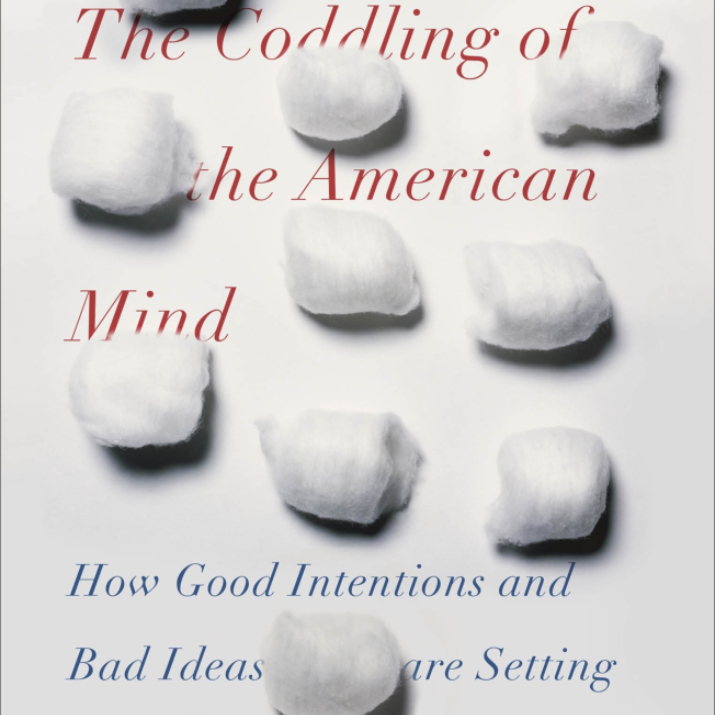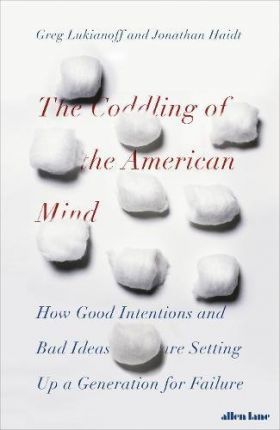The full title of this book is The Coddling of the American Mind : How Good Intentions and Bad Ideas Are Setting Up a Generation for Failure. I found it a fascinating read, albeit one which was hard to get into in the beginning. The authors Haidt and Lukianoff are American and most of the examples they cite are American, but I felt there was still much I could take away from the book, in particular on how I can parent our kids.
There are three quotes at the beginning of the book which highlight the key themes or “Great Untruths” that Haidt and Lukianoff discuss in the book.
Prepare the child from the road, not the road for the child. ~ Folk Wisdom, origin unknown
Your worst enemy cannot harm you as much as your own thoughts unguarded. But once mastered, no on can help you as much, not even your father or your mother. ~ Buddha, Dhammapada
The line dividing good and evil cuts through the heart of every human being. ~ Aleksandr Solzhenitsyn, The Gulag Archipelago
Haidt and Lukianoff contend that in well meaning attempts to protect and keep safe children and college students in America, the reverse is actually happening as the actions taken contradict both basic psychological principles and the ancient wisdom of many cultures.
They believe there is three Great Untruths which dominate current thinking and behaviour:
1. The Untruth of Fragility: What doesn’t kill you makes you weaker
To explain what the authors see as a pervasive way of overprotecting children or “safetyism”, the use results from “Learning Early About Peanut” (LEAP) 2015 study.
Over 600 children between 4 and 11 months of age at high risk for peanut allergy were randomized to either consume or avoid peanut until age 5 in order to compare the incidence of peanut allergy between the two groups. Children in the peanut consumption arm of the trial ate a peanut-containing snack-food at least three times each week, while children in the peanut avoidance arm did not ingest peanut-containing foods.
Of the children who avoided peanut, 17% developed peanut allergy by the age of 5 years. Remarkably, only 3% of the children who were randomized to eating the peanut snack developed allergy by age 5. Therefore, in high-risk infants, sustained consumption of peanut beginning in the first 11 months of life was highly effective in preventing the development of peanut allergy.
“For decades allergists have been recommending that young infants avoid consuming allergenic foods such as peanut to prevent food allergies,” notes Professor Lack, the lead investigator for the LEAP study. “Our findings suggest that this advice was incorrect and may have contributed to the rise in the peanut and other food allergies.”
While advice on avoiding peanuts had the intention of preventing children developing peanut allergies, it actually caused more harm. Raising kids with the mindset that they are fragile is doing them harm also. If we try to protect them from every danger we can think of, it can set off a feedback loop where kids then become more fragile and less resilient as they experience less challenges and stress, then adults think they need to even more protection and that simply increases the child’s fragility and lack of resilience.
They are not recommending that we make the lives of our children unbearably hard, but that we learn to appreciate that just like the immune system of the child needs to have small tests to build up immunisation, kids need age appropriate challenges and stressors, so they can mature and grow mentally.
2. The Untruth of Emotional Reasoning: Always trust your feelings
Trust your feelings is something heard frequently and while it is important to listen to your feelings, Haidt and Lukianoff highlight the human tendency for cognitive distortions like emotional reasoning (I feel depressed; therefore, my marriage is not working out), catastrophizing (It would be terrible if I failed), blaming (My parents caused all my problems) or mind reading (He thinks I am a loser).
Critical thinking is required to challenge our cognitive distortions and the authors argue that this is what is currently missing on college campuses in America. The rise in the term and accusations of “microaggressions” highlight they believe, a shift from “intent” to “impact”. By encouraging students to interpret the actions of others in the least generous way, assuming malintent, it can be encouraging cognitive distortions in students and setting themselves up for higher levels of distrust and conflict.
3. The Untruth of Us Versus Them: Life is a battle between good people and evil people
Humans are naturally programmed to live in tribes. Our modern minds readily divide the world into “us” and “them” even on trivial or arbitrary criteria, which can take shape in the form of identity politics. The authors outline two types of identity politics:
- common humanity identity politics – as practiced by Martin Luther King where it humanizes their opponents and appeal to their humanity while also applying political pressure in other ways.
- common enemy identity politics – this is the idea of uniting groups based on a belief that there is one group that is evil.
Haidt and Lukianoff contend common enemy identity politics when combined with microaggression theory, produces a call-out culture in which almost anything one says or does could result in public shaming and this currently rife on university campuses across America.
It was once the authors had outlined these truths I began to find the reading more easy and enjoyed it more. Part II highlights many examples of how these untruths are having unintentional negative consequences.
Part III
Part III was the most interesting for me and the part I took the most away from. It looks at how America got to this point (and I would say Australia has some similar issues too) highlighting the following as key factors:
- The Polarization Cycle – Every two years, the American National Election Study measures American’s attitudes on a variety of topics, including ratings of groups and institutions. American’s feelings to their own political party have barley changed since the 1970s, but Americans have become increasingly cold or hostile toward the other party since the 1990s.
- Anxiety and Depression – This was the most disturbing factor for me. For what they are calling the iGen (1995 – 2012) there has been increased rates of anxiety and depression. The increases for girls and young women are much larger than their male counter parts. The increase isn’t just about changes in definitions or reporting, but they are showing up in terms of rising hospital admission rates of self-harm and in rising suicide rates. The suicide rate of adolescent girls has doubled since 2007 (still below that of boys).
- Paranoid Parenting – kids have far more restricted childhoods in general compared to their parents. As a consequence they have missed out on many challenges, negative experiences and minor risks that help them develop into strong, competent and independent adults.
- The Decline of Play – children have much less free play, are more scheduled and have more screen time. Kids deprived of free play are likely to be less competent – physically and socially as adults.
- The Bureaucracy of Safetyism – the number of campus administrators has grown more rapidly than the number of professors, and professors have gradually come to play a smaller role in the administration of universities. The result has been a trend toward “corporatization” of universities.
- The Quest for Justice – it is not that the authors think the quest for justice is a bad thing, but they make a distinction between the two main types of justice distributive justice and procedural justice and how issues can arise when the focus does not take into account both.
Part IV
Part IV looks at how we can help create wiser kids, wiser universities and wiser societies. It is a shorter part of the book and from the authors’ thoughts on what causes the problem, you already have a good feel of what will help to improve the current situation.
I would highly recommend reading The Coddling of the American Mind, it made me think deeply about issues that I haven’t considered for some time or at all. There were some questions I had on some of the conclusions they have drawn from on campus issues. Not living in America, it is hard to understand the exact extent of the issues they discuss through out the book, but I did wonder if these issues were occurring on all campuses or is it limited to a minority that are more well known?
The three quotes highlighted in the beginning of the book and that I copied above will stay with me, as will the three great untruths. I want to educate my kids on the three untruths Haidt and Lukianoff see as currently being pervasive, because I believe:
- they are not fragile
- they need to be critical thinkers
- they need to not always assume malintent in actions of those they disagree with
Have you read The Coddling of the American Mind : How Good Intentions and Bad Ideas Are Setting Up a Generation for Failure? If so, what did you think? I would love to hear!
Some of the links contain affiliate links, which means at no extra cost to you, making purchases through them helps support this site. Thank you!


